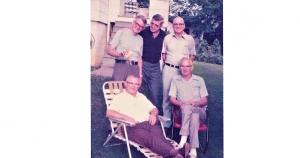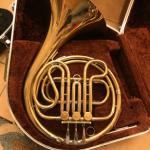Dad posted a picture of both my grandfathers relaxing with friends and I am made happier every time I see that snapshot. (Kodachrome!)
They are the age I always remember them, strong and omnicompetent, sitting with some men, probably from the church, talking most likely doctrine. Right down to the webbed lounger on an aluminum frame, the details are accurate. This was a normal good time in that time.
This was the way it was.
Papaw Shelby is pretending to pour water on Papaw Earl. He was mischievous. If Papaw Shelby had followed through with the little prank, then Papaw Earl hardly would have reacted. He might have noted that the cool water felt good on a muggy West Virginia afternoon. They were great friends before my dad married Mom and that happy event gave them many holidays together.
I am blessed to have known both grandparents and to have parents who tell me all they can about them. Learning these family stories, honoring the good that was done, is vital. The classically educated man must begin with his own ancestors. He must place himself in the stories of the matriarchs and patriarchs that came before his time. This provides a deep rootedness in history. This rootedness, a love of family, place, people, is a place of security from which to find other even greater loves.
As a child grows, he comes to see imperfections.
Not all family lore is good. As one gets older, one hears of the sorrows, mistakes, and sins. The truth is the truth. Yet the goal is to love all that can be loved, before standing in judgment. This prepares the heart to accept as many and as much in God’s world as we can. Some set of ideas or some regime will be broken, mistaken, or wicked. The truth is the truth, but the person who knew his ancestors will not rush to the negative.
He is motivated by love, never fear.
When possible, beginning in honor towards our fathers and mothers is critical. This is the first commandment of God to come with a promise: our days will be long on the earth, This must be true, because when we learn the old stories, when we are rooted in the best parts of our past, then we recollect those lives. Our memory gives us a history that takes us back beyond our birth. When we share with our own children (and God willing grandchildren!), then we move forward into the future.
Know and honor, when you can, your own ancestors. This is the first step in a classical education. When we come to other conversations, other ancient stories, we can connect not just our own individual selves, but our heritage. The memories of our ancestors join in a great conversation with all the other ancient memories.
Books, especially the very best books, allow other, very distant, voices to be heard, being dead they yet speak. We listen and first honor what is wise before sitting in judgment.
A great evil is when society, such as that which enslaved millions of Americans, cuts people off from their ancestors. This cutting of the roots must be undone. Plato pictures the master educator as asking “whence?” And “whither?” The reconstruction and restoration of memories must be done where possible.
Other times there is not sufficient good to overcome the bad in the ancestral memory. When we cannot connect with our past, due to some evil, then we can work to start a new heritage connected to the good communities around us and to whatever fragments that can be saved. Coming to the great books and art that shaped the language we speak in the place we live can help. We can work at rootedness by telling the story of our neighborhood.
As best we can, we can look to the good, the truth, and beauty in the ancestors. Children begin by imitating. Adults create something better, if possible, based on the past.
















